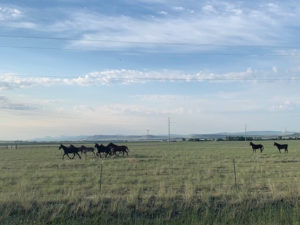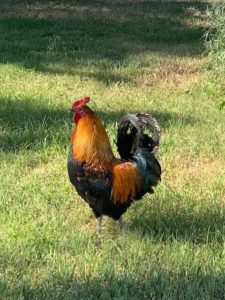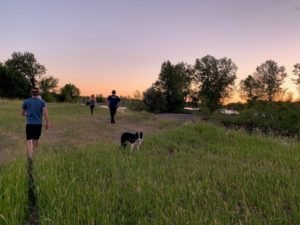
The early morning sun wrapped us in its warm light as we rode toward Choteau, Montana. As we crested a hill and came around a bend, we were greeted by a chorus of whinnying and stamping, as a herd of horses and mules matched our pace to escort us on our journey. I was thoroughly elated at their accompaniment, and my face broke into a joyous smile.
Animals are an essential component of my personal understanding of climate change, and they offer a priceless sense of joy and comfort amidst the anxieties provoked by climate change. As a student of conservation biology, I dedicate my time and effort to protecting and understanding wild animals, but I also experience a tremendous amount of comfort in the presence of all animals, both wild and domestic.
In this way, animals are a valuable alternative to more formal adaptations and responses to the stresses of climate change, and they offer a personal mechanism to supplement social and governmental support systems.
As the impacts of climate change become more and more pronounced, uncertainty may grow about the future of our lives and the world we live in.

During our Cycle the Rockies course, we met a number of inspiring individuals who are involved in unique efforts to address the impacts of climate change. Conversations with them revealed the ongoing impacts of climate change that are materializing much more quickly than we were pedaling.
Overwhelming feelings related to climate change may manifest themselves in our thoughts, actions, feelings, and interactions.
According to a recent assessment of literature, titled “Factors Influencing the Mental Health Consequences of Climate Change in Canada,” by Katie Hayes, Peter Berry, and Kristie L. Ebi, climate change places a burden on mental health and strains the methods we use to cope with changes in our world. The assessment highlights key factors that may facilitate proactive management of the mental health consequences of climate change on a societal level, although individual adaptations are also critical.
The most important findings in the analysis showed the wide range of mental health risks and impacts that might be experienced as the climate changes, along with the unequal risks and impacts that might be experienced between people in different societal and environmental groups. There is an equally diverse range of responses to cope with each person’s unique climate change experience.

On our journey across Montana, a cast of animals including cats, dogs, chickens, horses, deer, and bears took it upon themselves to help us process our feelings about climate change. Cats and dogs offered joy, friendship, and comfort in the moments when we needed it most. Roosters crowed to wake us in the morning. Horses showcased their beauty as they galloped along with us down the road. Deer entertained us as they sprung across the road in the nick of time. Prairie dogs yipped as we towered over their underground kingdoms. Bears displayed their power when they consumed our every thought.
In the face of climate change, animals also offer an outstanding model for human social behavior as we work to support each other more fully.
By meeting each other in our individual and collective grief, depression, and anxieties about rising temperatures, rising sea levels, intensifying fires, prolonged droughts, and disappearing organisms, we can ease tension and reduce aggression toward each other. We can lean into each other, like a dog seeking a pat on the head.
In this new environment of understanding and compassion, we can take more meaningful actions to address the causes of climate change and consider new possibilities for reducing our ongoing contribution to carbon emissions through our energy consumption, agricultural methods, and land management decisions. We can be like prairie dogs, who live in community, working to shape a world that protects their society.
Although climate change may seem like an all-encompassing burden, we can lean on animals for their comforting presence and follow their examples to account for the pressures that arise from the impacts of a rapidly changing world.
Lukas Keller is a student at Colorado State University studying Fisheries, Wildlife, and Conservation Biology.